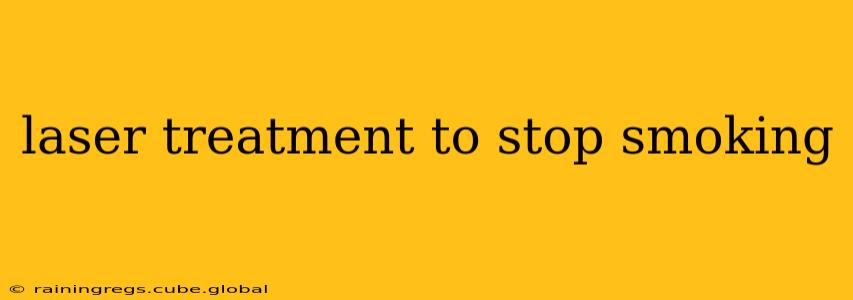Smoking cessation is a significant challenge for many, with numerous methods employed to help individuals quit. One relatively newer approach gaining attention is laser treatment for smoking cessation. While not a magic bullet, it's showing promise as a complementary therapy to help smokers break free from nicotine addiction. This comprehensive guide explores laser treatment, its mechanisms, effectiveness, and what you should consider before pursuing this option.
How Does Laser Treatment for Smoking Cessation Work?
Laser treatment for smoking cessation, often referred to as low-level laser therapy (LLLT) or photobiomodulation, doesn't directly target nicotine itself. Instead, it focuses on specific acupuncture points believed to influence cravings and withdrawal symptoms. The low-level laser emits light energy, which is thought to stimulate these points, potentially reducing the intensity of cravings and improving overall well-being during the quitting process. The precise mechanism isn't fully understood, but research suggests it may involve:
- Reducing stress hormones: Nicotine withdrawal often involves increased stress and anxiety. LLLT may help regulate these hormones, making the process easier.
- Boosting endorphin levels: Endorphins are natural mood elevators. LLT may increase endorphin production, helping counter the negative mood associated with quitting.
- Improving cellular function: Some studies suggest LLLT can improve cellular energy production, potentially aiding in the body's natural healing processes during withdrawal.
Is Laser Treatment Effective for Quitting Smoking?
The effectiveness of laser treatment for smoking cessation is still under investigation. While some studies show promising results, more large-scale, well-designed clinical trials are needed to definitively confirm its efficacy. Many studies show it is most effective when used in conjunction with other cessation methods, such as counseling, nicotine replacement therapy (NRT), or medication. The success rate may vary depending on factors such as individual commitment, overall health, and the presence of other contributing factors to smoking behavior.
It's crucial to understand that laser treatment is not a stand-alone solution for everyone. It is often considered a supportive therapy, enhancing the effects of other cessation methods.
What are the Side Effects of Laser Treatment for Smoking Cessation?
Generally, laser treatment for smoking cessation is considered a safe procedure with minimal side effects. Some individuals may experience mild temporary discomfort or redness at the treatment sites, but these are usually short-lived. However, it is crucial to select a qualified and experienced practitioner to minimize any potential risks. Always discuss your medical history and any potential contraindications with your healthcare provider before starting this treatment.
Does Insurance Cover Laser Treatment for Smoking Cessation?
Insurance coverage for laser treatment for smoking cessation varies widely depending on the specific insurance provider and policy. Some insurance plans may cover it as part of a comprehensive smoking cessation program, while others may not. It's recommended to contact your insurance company directly to inquire about coverage before undergoing treatment.
How Much Does Laser Treatment for Smoking Cessation Cost?
The cost of laser treatment for smoking cessation can vary depending on several factors, including the number of treatment sessions required, the clinic's location, and the practitioner's fees. It's best to contact clinics directly to obtain accurate pricing information.
Is Laser Treatment for Smoking Cessation Right for Me?
Laser treatment may be a suitable option for individuals who:
- Are strongly motivated to quit smoking.
- Are willing to combine it with other smoking cessation methods.
- Are looking for a non-invasive, potentially less stressful way to manage withdrawal symptoms.
However, it's essential to discuss your situation with your doctor or a qualified healthcare professional. They can help you assess your suitability for this treatment and recommend the most appropriate approach for your specific needs. Consider the potential benefits and drawbacks carefully and make an informed decision based on your circumstances. Remember, quitting smoking is a personal journey, and finding the right combination of support and strategies is crucial for long-term success.
